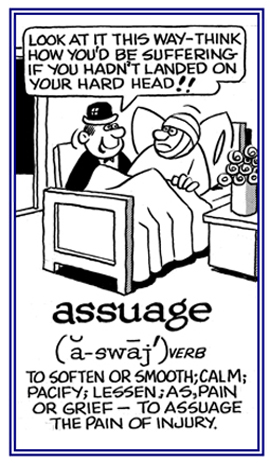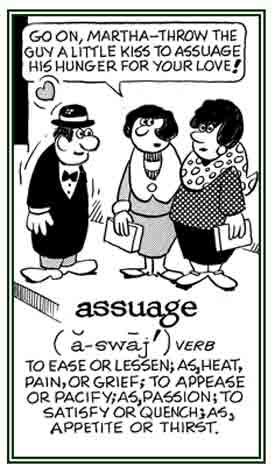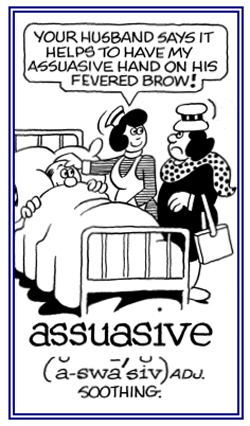suad-, suas-, suav-
(Latin: suavis, "sweet"; suadere, "to advise"; "to make something pleasant to, to present in a pleasing manner"; hence "to recommend, to advise")
assuage (verb), assuages; assuaged; assuaging
1. To attempt to make a situation less painful or severe, such as an unpleasant feeling or pain: During the economic crisis, Ted tried to assuage the investor's fears with guarantees that his company was still doing well.
2. Etymology: essentially from Latin as, "to" (a variant of ad) before s + suavis, "sweet, agreeable".


© ALL rights are reserved.
Go to this Word A Day Revisited Index
2. Etymology: essentially from Latin as, "to" (a variant of ad) before s + suavis, "sweet, agreeable".


Go to this Word A Day Revisited Index
so you can see more of Mickey Bach's cartoons.
A feeling that results when something troublesome is eliminated or is lessened; alleviation; relief: It came as a total assuagement when Dr. Smith told Mrs. Thompson that she didn't have cancer at all!
Something or someone that decreases, mitigates, or relieves pain, emotional situations, hunger, or some other unpleasant physical or mental condition: When each of the workers on the farm came in for dinner, they were all very thankful for their assuager who prepared such delicious meals for their ravenous bellies!
A soothing medicine or medical treatment that soothes or makes an ailment easier to endure: "Whenever she went to the physical therapist, the assuasives that were applied relieved Joan of pain and always made her feel as if she were recovering from the injuries that she suffered when she slipped and fell down."
assuasive (adjective), more assuasive, most assuasive
Pertaining to restoring confidence and relieving anxiety: George heard the doctor's assuasive voice saying that he would recover and feel much better after the operation.

© ALL rights are reserved.
Go to this Word A Day Revisited Index

Go to this Word A Day Revisited Index
so you can see more of Mickey Bach's cartoons.
convince, persuade
convince (kuhn VINS) (verb)
To bring to an understanding by means of an argument or discussion: Jack mentioned, "Casey, you might be able to convince the teacher that your point of view is right if you can show him another piece of evidence from an authoritative source."
persuade (puhr SWAYD) (verb)
To determine a course of action as the result of reasoning or pleading: Jane said, "O.K., Kurt, if you can persuade my husband to go out for dinner tonight, then I will go, too."
Muriel, if I can persuade you to carry an umbrella, your argument for a walk through the park in this hot sun will convince me of your intention not to get skin cancer.
dissuade (verb), dissuades; dissuaded; dissuading
dissuasive (adjective), more dissuasive, most dissuasive
dissuasively (adverb), more dissuasively, most dissuasively
persuadable (adjective), more persuadable, most persuadable
Susceptible to being convinced; suasible: It took a bit of assurance and positive arguments to induce Susan to go with the group, but she was persuadable in the end, and then all the friends went swimming in the lake!
persuadably (adjective), more persuadably, most persuadably
1. Descriptive of how someone can be urged to do something: Jim's father asked him persuadably to please take out the garbage before dinner.
2. Concerning how a person can be convinced to believe by imploring to reason or understanding: Mary used all kinds of arguments when asking her mother persuadably if she could go to the seaside with her friends.
2. Concerning how a person can be convinced to believe by imploring to reason or understanding: Mary used all kinds of arguments when asking her mother persuadably if she could go to the seaside with her friends.
Jim tried to assure the police in a persuadably acceptable and cogent manner that he was never going to drink while driving again.

